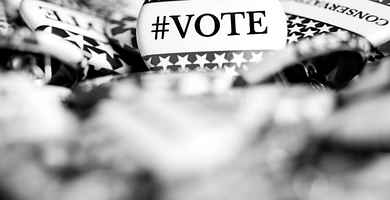Ohio Ballot Measure
The widely reported and controversial Ohio ballot measure, Issue 1, drew over 700,000 early voters and more than 3 million votes in total: A high turnout for an off-year August special election. And, according to reports, over $40 million was spent by groups on both sides of this issue.
Ultimately, Ohioans rejected Issue 1, meaning the threshold for approval of constitutional amendments remains a simple majority and that petitions need to only bear signatures from 44 out of the state’s 88 counties.
This outcome has obvious consequences for the next round of the reproductive rights fight and the next election cycle: November’s ballot measure that will establish “a fundamental right to reproductive freedom” now has a slightly easier path to passage for proponents of the amendment.
Mississippi’s Statewide Primary Results
Governor
Incumbent Governor Tate Reeves easily secured the Republican nomination, defeating two challengers, Dr. John Witcher and David Grady Hardigree, with 75% of votes. Reeves is vying for a second term in the governor’s mansion after previously serving two terms as state treasurer and two terms as lieutenant governor under Governor Phil Bryant (R). Reeves is promoting the progress he claims Mississippi has made under his leadership. He is also prioritizing workforce development and the elimination of state income tax during this round of re-election campaigning.
Governor Reeves will face Mississippi Public Service Commissioner Brandon Presley in November, who ran unopposed in yesterday's primary.
Presley has served as the Public Service Northern District Commissioner since 2008 and previously served as the Mayor of Nettleton from 2001-2007. He has described himself as a "Populist, FDR-Billy McCoy Democrat" and has put corruption and ethics at the forefront of his campaign, promising to "crack down on corrupt lobbyists and cronyism in Jackson." Expanding Medicaid and increasing funding for community colleges and vocational training are also priority issues for the Commissioner.
Initial polling shows Presley with a double-digit gap to fill, although not all hope is lost for the Democrat; Morning Consult polls place Reeves as the fifth most unpopular governor in the nation. Nonetheless, challenging the incumbent governor will be an uphill battle. Reeves’ sizable campaign purse and the state’s conservative lean make him a formidable opponent even with low approval ratings.
Lieutenant Governor
D. Ryan Grover (D) advanced to the general election for lieutenant governor as the Democratic Party’s only candidate. Raised in Hattiesburg MS, Grover is running on a platform that includes an emphasis on workforce development, voting rights, and sustainability. Grover believes it is important to prepare students for the modern workforce and attract entrepreneurs, production facilities, and tech companies to the state.
The Republican primary saw three candidates. Incumbent Lt. Governor Delbert Hosemann (R) was challenged by State Senator Chris McDaniel (R), who represents parts of Forrest and Jones counties, and Tiffany Longino (R), a college professor and PhD candidate. Polls leading up to the primary showed Hosemann with a substantial lead over McDaniel while Longino trailed far behind. Hosemann and McDaniel clashed in late July at the Neshoba County Fair, an annual event that draws many to the east central Mississippi area. The two rehashed mutual accusations of dishonesty and ineffectiveness over a range of issues, from tax policy to legislative appointments.
In the end, Hosemann won the Republican Party’s nomination with approximately 51% of the vote. He was first elected in 2019 and previously served as secretary of state from 2008-2020. Raised in Warren County, he worked in the private sector as a businessman and tax layer with the firm Phelps Dunbar, LLP. Hosemann earned a bachelor’s degree in business from the University of Notre Dame and attended law school at the University of Mississippi. He also attained a Master of Laws in Taxation from New York University. Hosemann served in the U.S. Army Reserve before attending law school. He is running on a platform that advocates for small businesses, streamlined government, improved education and infrastructure, and better access to health care.
Attorney General
Facing no challengers within their respective parties, incumbent Attorney General Lynn Fitch (R) and Greta Martin (D) are focused on the general election for Attorney General of the Magnolia State.
Fitch is Mississippi’s first female attorney general. Fitch previously served as the state treasurer for eight years following many years in private practice and a stint as an assistant attorney general. Fitch has focused on supporting crime victims, prosecuting deceptive practices and fraud, defending the Second Amendment, fighting the opioid crisis, supporting pro-life policies, and combatting human trafficking. If re-elected, Fitch plans to introduce a Parents’ Bill of Rights as well as a Women’s Bill of Rights.
Martin serves as the Litigation Director for Disability Rights Mississippi, the protection and advocacy agency for the state. Martin promises to prosecute corruption within state government, enforce labor laws, focus on Mississippi cases rather than national issues, and protect women’s rights, including equal pay and combatting domestic violence. If successful in the general election, Martin intends to establish a labor division in the attorney general’s office to protect worker’s rights along with defending women’s rights, including access to reproductive healthcare.
Of Note
The Mississippi House will undergo a major leadership shakeup in 2024 as Speaker Phillip Gunn (R) is not seeking re-election. Speaker Pro Tem Jason White (R) has been laying the groundwork for a future run for Speaker.
